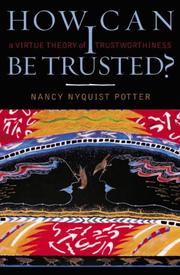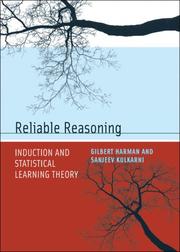| Listing 1 - 6 of 6 |
Sort by
|

ISBN: 0742511502 1461637465 9781461637462 9780742511507 0742511510 9780742511514 Year: 2002 Publisher: Lanham, Maryland : Rowman & Littlefield Publishers, Inc.,
Abstract | Keywords | Export | Availability | Bookmark
 Loading...
Loading...Choose an application
- Reference Manager
- EndNote
- RefWorks (Direct export to RefWorks)
This work examines the concept of trust in the light of virtue theory, and takes our responsibility to be trustworthy as central. Rather than thinking of trust as risk-taking, Potter views it as equally a matter of responsibility-taking. Her work illustrates that relations of trust are never independent from considerations of power, and that asking ourselves what we can do to be trustworthy allows us to move beyond adversarial trust relationships and toward a more democratic, just, and peaceful society.
Trust. --- Reliability. --- Dependability --- Trustworthiness --- Conduct of life --- Trust (Psychology) --- Attitude (Psychology) --- Emotions --- Theory of knowledge
Book
ISBN: 9781503604537 9780804793612 1503604535 0804793611 Year: 2018 Publisher: Redwood City Stanford University Press
Abstract | Keywords | Export | Availability | Bookmark
 Loading...
Loading...Choose an application
- Reference Manager
- EndNote
- RefWorks (Direct export to RefWorks)
No detailed description available for "Organizing for Reliability".
Organization theory --- E-books --- Organizational effectiveness --- Reliability --- Organizational resilience --- Management --- Administration --- Industrial relations --- Organization --- Resilience of organizations --- Organizational change --- Dependability --- Trustworthiness --- Conduct of life --- Organizational effectiveness. --- Reliability. --- Organizational resilience. --- Management.

ISBN: 9780262083607 0262083604 0262517345 9786612098505 0262274973 1282098500 1429465611 9780262274975 9781282098503 9781429465618 Year: 2007 Volume: 2007 Publisher: Cambridge, Mass. MIT
Abstract | Keywords | Export | Availability | Bookmark
 Loading...
Loading...Choose an application
- Reference Manager
- EndNote
- RefWorks (Direct export to RefWorks)
The implications for philosophy and cognitive science of developments in statistical learning theory.
Philosophy of science --- Reasoning --- Reliability --- Induction (Logic) --- Computational learning theory --- Raisonnement --- Fidélité --- Induction (Logique) --- Apprentissage informatique, Théorie de l' --- Théorie de l'apprentissage informatique --- Fidélité --- Théorie de l'apprentissage informatique --- Reasoning. --- Reliability. --- Computational learning theory. --- COGNITIVE SCIENCES/General --- PHILOSOPHY/General --- Machine learning --- Inductive logic --- Logic, Inductive --- Logic --- Dependability --- Trustworthiness --- Conduct of life --- Argumentation --- Ratiocination --- Reason --- Thought and thinking --- Judgment (Logic)
Book
ISBN: 9789044641646 9044641646 Year: 2020 Publisher: Amsterdam Prometheus
Abstract | Keywords | Export | Availability | Bookmark
 Loading...
Loading...Choose an application
- Reference Manager
- EndNote
- RefWorks (Direct export to RefWorks)
"Hij is een origineel schrijver en denker en een geweldig stilist, met niet zelden een fijnzinnig gevoel voor humor. Hij maakt nieuwsgierig, zet aan tot denken en is kritisch op een zeer unieke manier." Zo beschreef de jury van de Heldringprijs 2018 het werk van Maxim Februari, schrijver van romans, verhalen, essays en columns waarin de grote thema's van deze tijd erudiet worden besproken, met oog voor de eigenaardigheden van het dagelijks leven. In 'De onbetrouwbare verteller' werpt Februari nieuw licht op zijn oude overtuigingen. Zijn kerngedachte is dat je de complexiteit van het bestaan niet kunt samenvatten in modellen en rationalisaties. Je kunt proberen greep te krijgen op de wereld door te praten en te schrijven, maar altijd ontgaat je de essentie. Nu, in deze nieuwe eeuw, wordt de woordcultuur vervangen door een rekencultuur. Die claimt het bestaan wel volledig te begrijpen en zelfs te kunnen voorspellen. Maar dat is bluf. 'De onbetrouwbare verteller' is een selectie eerder verschenen essays, columns en lezingen. Plus een kort verhaal, 'Razernij', waarin het psychologische portret wordt geschetst van een jongeman die onverwacht iets niet wil.
Dutch literature --- digitalisering --- ethiek --- filosofie --- Digital media --- Information society --- Privacy --- Reliability --- Power (Social sciences) --- Social ethics --- Empowerment (Social sciences) --- Political power --- Exchange theory (Sociology) --- Political science --- Social sciences --- Sociology --- Consensus (Social sciences) --- Social aspects --- Dependability --- Trustworthiness --- Conduct of life --- Social psychology --- Secrecy --- Solitude --- Information superhighway --- Ethics --- Social problems
Book
ISBN: 9783110408102 9783110408263 9783110408416 3110408104 3110408279 3110553090 3110408414 3110408260 9783110408270 9783110553093 Year: 2015 Publisher: Berlin ; Boston : Walter de Gruyter GmbH,
Abstract | Keywords | Export | Availability | Bookmark
 Loading...
Loading...Choose an application
- Reference Manager
- EndNote
- RefWorks (Direct export to RefWorks)
"Initiating a transgeneric, intermedial and interdisciplinary approach to narrative unreliability, this volume is meant to enrich, modify and refine our understanding of (un)reliable narration by taking into account not only different genres and media, but also research in a variety of disciplines. The three sections of the volume comprise articles on the theory of unreliable narration, transgeneric and intermedial issues as well as studies from areas such as journalism, politics, law and medicine" --
Narration (Rhetoric) --- Discourse analysis, Narrative. --- Reliability. --- Truthfulness and falsehood --- Fiction --- Literary rhetorics --- 82-3 --- 82-3 Proza. Fictie. Narratologie --- Proza. Fictie. Narratologie --- Narration (Rhetoric). --- Truthfulness and falsehood. --- Narrative (Rhetoric) --- Narrative writing --- Rhetoric --- Discourse analysis, Narrative --- Narratees (Rhetoric) --- Believability --- Credibility --- Falsehood --- Lying --- Untruthfulness --- Reliability --- Truth --- Honesty --- Dependability --- Trustworthiness --- Conduct of life --- Narrative discourse analysis --- Post-truth --- 82-3 Fiction. Prose narrative --- Fiction. Prose narrative --- Unreliable narration. --- intermedial/transgeneric narratology.
Book
ISBN: 9782503517582 2503517587 2503517582 9782503539331 Year: 2008 Volume: 13 Publisher: Turnhout: Brepols,
Abstract | Keywords | Export | Availability | Bookmark
 Loading...
Loading...Choose an application
- Reference Manager
- EndNote
- RefWorks (Direct export to RefWorks)
Trust is the basis of all social relations. It presupposes the concordance of word and deed. Trust is not created spontaneously, but requires a process of observation and socialization, and thus is culturally determined and subject to change. Writing may engender trust, and trust may be placed in written texts.The contributions to this volume address the complex relationships between ‘trust’ and ‘writing’ in the Middle Ages. They deal with charters, historiography, letters, political communication, and the possibilities of trust in writing. Some of the questions addressed are: Does writing as a medium engender trust irrespective of the contents of the written text? Was trust in writing dependent on trust in an authority? Was the written form of the text meant to confer trust on its contents? Did rituals take place that were meant to enhance the text’s trustworthiness? Can changes be observed in the strategies of engendering trust? Was trust considered food for reflection in written texts? What was considered to constitute a breach of trust? The volume is dedicated to Michael Clanchy, whose work inspired much of its contents.
History of civilization --- History of Europe --- anno 500-1499 --- Literacy --- Trust --- Reliability. --- Writing --- Diplomatics --- Learning and scholarship --- Alphabétisation --- Confiance --- Fidélité --- Ecriture --- Diplomatique --- Savoir et érudition --- Social aspects --- History --- Social aspects. --- Aspect social --- Histoire --- Europe --- Intellectual life --- Vie intellectuelle --- Trust in literature --- Reliability --- Education --- Social Sciences --- Education, Special Topics --- 930.85.42 --- Cultuurgeschiedenis: Middeleeuwen --- Conferences - Meetings --- 930.85.42 Cultuurgeschiedenis: Middeleeuwen --- Alphabétisation --- Fidélité --- Savoir et érudition --- Chirography --- Handwriting --- Language and languages --- Ciphers --- Penmanship --- Trust (Psychology) --- Attitude (Psychology) --- Emotions --- Trust (Psychology) in literature --- Dependability --- Trustworthiness --- Conduct of life --- Illiteracy --- General education --- Council of Europe countries --- Eastern Hemisphere --- Eurasia --- 316.776 --- 316.776 Communicatieprocessen --- Communicatieprocessen --- Trust in literature - Congresses --- Literacy - Social aspects - Europe - History - To 1500 - Congresses --- Trust - Social aspects - Congresses --- Reliability - Congresses --- Writing - History - To 1500 - Congresses --- Europe - History - 476-1492 - Congresses
| Listing 1 - 6 of 6 |
Sort by
|

 Search
Search Feedback
Feedback About UniCat
About UniCat  Help
Help News
News